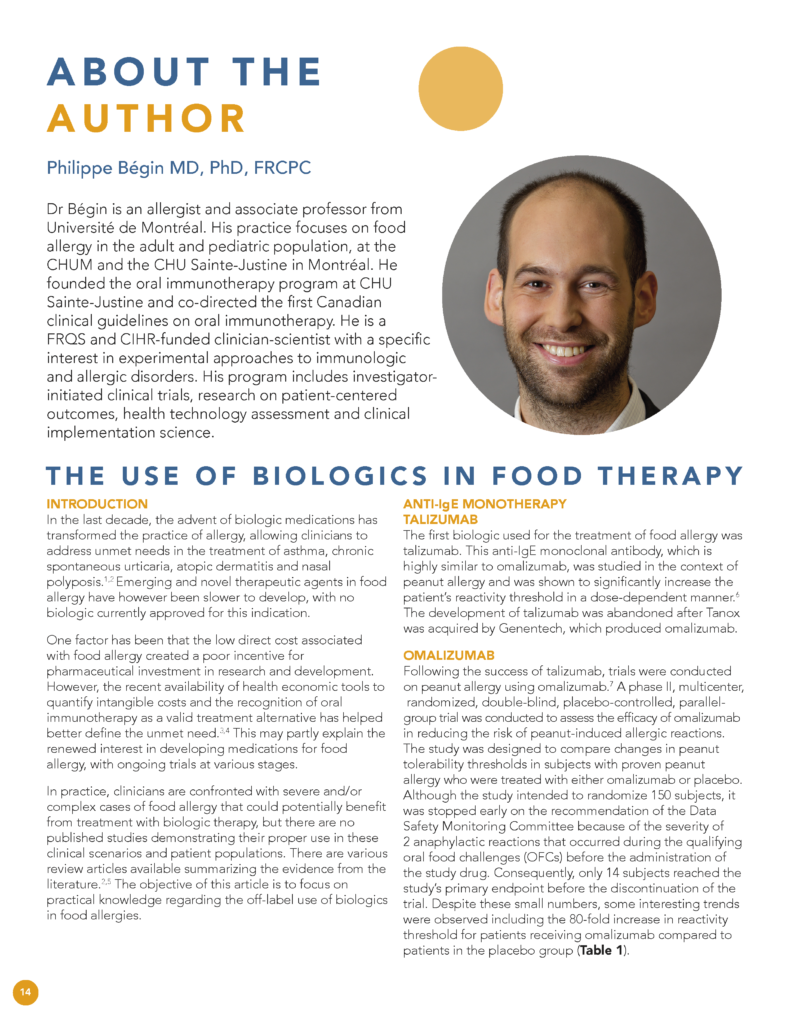The Use of Biologics in Food Therapy
DOI:
https://doi.org/10.58931/cait.2022.2231Abstract
In the last decade, the advent of biologic medications has transformed the practice of allergy, allowing clinicians to address unmet needs in the treatment of asthma, chronic spontaneous urticaria, atopic dermatitis and nasal polyposis. Emerging and novel therapeutic agents in food allergy have however been slower to develop, with no biologic currently approved for this indication. One factor has been that the low direct cost associated with food allergy created a poor incentive for pharmaceutical investment in research and development. However, the recent availability of health economic tools to quantify intangible costs and the recognition of oral immunotherapy as a valid treatment alternative has helped better define the unmet need. This may partly explain the renewed interest in developing medications for food allergy, with ongoing trials at various stages. In practice, clinicians are confronted with severe and/or complex cases of food allergy that could potentially benefit from treatment with biologic therapy, but there are no published studies demonstrating their proper use in these clinical scenarios and patient populations. There are various review articles available summarizing the evidence from the literature. The objective of this article is to focus on practical knowledge regarding the off-label use of biologics in food allergies.
References
Azzano, P., Dufresne, E., Poder, T. & Begin, P. Economic considerations on the usage of biologics in the allergy clinic. Allergy 76, 191-209 (2021).
de Silva, D., et al. Allergen immunotherapy and/or biologicals for IgE-mediated food allergy: systematic review and meta-analysis. Allergy (2022).
Watts, Y., et al. Mapping the Food Allergy Quality of Life Questionnaire Parent Form onto the SF-6Dv2. Allergy (2021).
Dufresne, E., Poder, T.G. & Begin, P. The value of oral immunotherapy. Allergy 75, 1291-1293 (2020).
Fiocchi, A., Vickery, B.P. & Wood, R.A. The use of biologics in food allergy. Clin Exp Allergy 51, 1006-1018 (2021).
Leung, D.Y., et al. Effect of anti-IgE therapy in patients with peanut allergy. N Engl J Med 348, 986-993 (2003).
Sampson, H.A., et al. A phase II, randomized, doubleblind, parallelgroup, placebocontrolled oral food challenge trial of Xolair (omalizumab) in peanut allergy. J Allergy Clin Immunol 127, 1309-1310 e1301 (2011).
Gauvreau, G.M., et al. Efficacy and safety of multiple doses of QGE031 (ligelizumab) versus omalizumab and placebo in inhibiting allergen-induced early asthmatic responses. J Allergy Clin Immunol 138, 1051-1059 (2016).
Maurer, M., et al. Ligelizumab for Chronic Spontaneous Urticaria. N Engl J Med 381, 1321-1332 (2019).
Azzano, P., et al. Determinants of omalizumab dose-related efficacy in oral immunotherapy: Evidence from a cohort of 181 patients. J Allergy Clin Immunol 147, 233-243 (2021).
Gasser, P., et al. The mechanistic and functional profile of the therapeutic anti-IgE antibody ligelizumab differs from omalizumab. Nat Commun 11, 165 (2020).
Chang, T.W. The pharmacological basis of anti-IgE therapy. Nat Biotechnol 18, 157-162 (2000).
Nadeau, K.C., Schneider, L.C., Hoyte, L., Borras, I. & Umetsu, D.T. Rapid oral desensitization in combination with omalizumab therapy in patients with cow’s milk allergy. J Allergy Clin Immunol 127, 1622-1624 (2011).
Nadeau, K.C., Kohli, A., Iyengar, S., DeKruyff, R.H. & Umetsu, D.T. Oral immunotherapy and anti-IgE antibody-adjunctive treatment for food allergy. Immunol Allergy Clin North Am 32, 111-133 (2012).
Takahashi, M., et al. Oral immunotherapy combined with omalizumab for high-risk cow’s milk allergy: a randomized controlled trial. Sci Rep 7, 17453 (2017).
Martorell-Calatayud, C., et al. Anti-IgE-assisted desensitization to egg and cow’s milk in patients refractory to conventional oral immunotherapy. Pediatr Allergy Immunol 27, 544-546 (2016).
Schneider, L.C., et al. A pilot study of omalizumab to facilitate rapid oral desensitization in high-risk peanut-allergic patients. J Allergy Clin Immunol 132, 1368-1374 (2013).
Lafuente, I., et al. Possible recurrence of symptoms after discontinuation of omalizumab in anti-IgE-assisted desensitization to egg. Pediatr Allergy Immunol 25, 717-719 (2014).
Begin, P., et al. Phase 1 results of safety and tolerability in a rush oral immunotherapy protocol to multiple foods using Omalizumab. Allergy Asthma Clin Immunol 10, 7 (2014).
Wood, R.A., et al. A randomized, double-blind, placebo-controlled study of omalizumab combined with oral immunotherapy for the treatment of cow’s milk allergy. J Allergy Clin Immunol 137, 1103-1110 e1111 (2016).
MacGinnitie, A.J., et al. Omalizumab facilitates rapid oral desensitization for peanut allergy. J Allergy Clin Immunol 139, 873-881 e878 (2017).
Andorf, S., et al. Observational long-term follow-up study of rapid food oral immunotherapy with omalizumab. Allergy Asthma Clin Immunol 13, 51 (2017).
Begin, P., et al. CSACI guidelines for the ethical, evidence-based and patient-oriented clinical practice of oral immunotherapy in IgE-mediated food allergy. Allergy Asthma Clin Immunol 16, 20 (2020).
Beck, L.A., et al. Dupilumab treatment in adults with moderate-to-severe atopic dermatitis. N Engl J Med 371, 130-139 (2014).
Hirano, I., et al. Efficacy of Dupilumab in a Phase 2 Randomized Trial of Adults With Active Eosinophilic Esophagitis. Gastroenterology 158, 111-122 e110 (2020).
Frugier, C., et al. Atypical Eczematous Lesions Triggered by Oral Immunotherapy in a Patient with a Familial History of Psoriasis. J Allergy Clin Immunol Pract 9, 3479-3480 (2021).
Chinthrajah, S., et al. Phase 2a randomized, placebo-controlled study of anti-IL-33 in peanut allergy. JCI Insight 4(2019).

